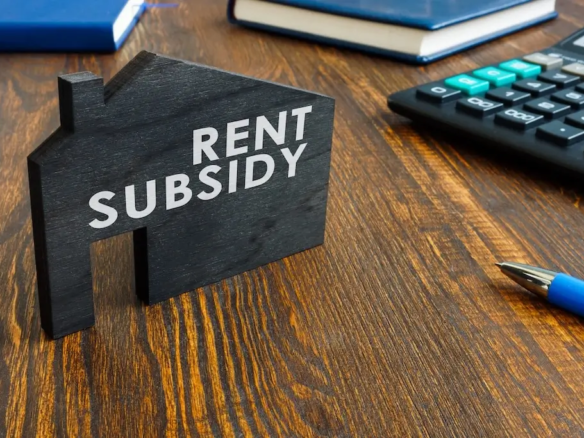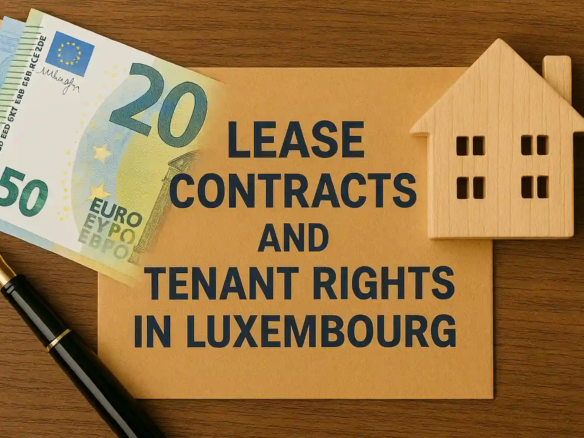Inhaltsverzeichnis
Um sich auf dem luxemburgischen Mietmarkt zurechtzufinden, ist ein umfassendes Verständnis der damit verbundenen finanziellen Verpflichtungen erforderlich, insbesondere im Hinblick auf Mietbürgschaften und Kautionen. Da am 1. August 2024 erhebliche Änderungen im luxemburgischen Mietrecht in Kraft treten, müssen Mieter und Vermieter die neuen Rahmenbedingungen für diese wesentlichen Aspekte der Immobilienmiete verstehen. Glücklicherweise bietet Luxemburg verschiedene Subventionen und finanzielle Unterstützungsprogramme an, die das Mieten zugänglicher und erschwinglicher machen.
Mietkautionen in Luxemburg verstehen
Eine Mietkaution, auch Mietkaution genannt, dient dem Vermieter als finanzieller Schutz vor möglichen Sachschäden, nicht gezahlter Miete oder anderen Mieterverpflichtungen. Diese Mietkaution verbleibt während der gesamten Mietdauer beim Vermieter und sollte bei Beendigung des Mietverhältnisses zurückgezahlt werden, sofern alle vertraglichen Verpflichtungen erfüllt wurden.
Die Mietkaution kann im luxemburgischen System verschiedene Formen annehmen. Sie können eine Bankbürgschaft hinterlegen, eine direkte Zahlung an den Vermieter leisten oder eine spezielle Mietkautionversicherung abschließen. Jede Option bietet unterschiedliche Vorteile und Überlegungen für beide am Mietvertrag beteiligten Parteien.
Jüngste Gesetzesänderungen im Rahmen des Mietgesetzes 2024
Die luxemburgische Mietlandschaft hat sich mit der neuen Gesetzgebung, die am 1. August 2024 in Kraft trat, grundlegend verändert. Ziel dieser Reformen war es, ein ausgewogeneres Verhältnis zwischen Mietern und Vermietern zu schaffen und gleichzeitig die anhaltenden Herausforderungen im Wohnungswesen des Großherzogtums anzugehen.
Reduzierte maximale Einzahlungsanforderungen
Eine der wichtigsten mieterfreundlichen Änderungen ist die Reduzierung der maximalen Mietkaution von drei auf zwei Monatsmieten. Diese Reduzierung macht das Mieten leichter, da sie die erhebliche finanzielle Belastung vieler Mieter im Vorfeld verringert. Das Gesetz verbietet Vermietern ausdrücklich, Kautionen zu verlangen, die zwei Monatsmieten (ohne Nebenkosten) übersteigen.
Strukturierter Rückgabeprozess mit klaren Fristen
Die neue Gesetzgebung legt klare Fristen für die Rückzahlung der Kaution fest. Sofern keine Sachschäden vorliegen und alle Mietzahlungen fällig sind, müssen Vermieter 501 TP3T der Kaution innerhalb eines Monats nach der Abnahme zurückzahlen. Die restlichen 501 TP3T müssen innerhalb eines Monats nach Erhalt der jährlichen Nebenkostenabrechnung zurückgezahlt werden.
Strafen für verspätete Rücksendungen
Der vielleicht wichtigste Aspekt für den Mieterschutz ist, dass das Gesetz nun erhebliche Strafen für Vermieter vorsieht, die die Rückzahlung der Kaution ungerechtfertigt verzögern. Für jeden Monat der Verzögerung müssen Vermieter mit einer Strafe von 101 TP3T Monatsmieten rechnen. Diese Regelung gibt Mietern einen erheblichen Einfluss darauf, die pünktliche Rückzahlung ihrer Kautionen zu gewährleisten.
Staatliche Unterstützung für Mietbürgschaften
Mietern, die sich die Mietkaution nicht leisten können, bietet Luxemburg staatliche Unterstützung bei der Finanzierung von Kautionen. Dieses Programm richtet sich an Haushalte, die die bei Vertragsabschluss erforderliche Kaution nicht bezahlen können. Unter bestimmten Voraussetzungen kann der Staat für Kautionen bis zu drei Monatsmieten bürgen.
Um Anspruch auf staatliche Unterstützung mit Mietbürgschaften zu haben, müssen Antragsteller volljährig sein, eine seit mindestens drei Jahren gültige Aufenthaltserlaubnis besitzen und nicht selbst Eigentümer einer Immobilie sein. Die Wohnung muss dem Antragsteller als Hauptwohnsitz dienen und die monatliche Miete darf ca. 1.250 Euro nicht übersteigen. Zudem darf das Einkommen des Antragstellers das 2,5-fache des garantierten Mindesteinkommens (RMG) nicht übersteigen.
Voraussetzung für diese Unterstützung ist der Abschluss einer bedingten Kautionsvereinbarung mit einem Finanzinstitut. Der Staat kann die Sicherheiten durch eine Pfandvereinbarung einfordern. Der Höchstbetrag der Unterstützung ist auf 573 Euro pro Monatsmiete begrenzt. Daher ist diese Unterstützung besonders für diejenigen interessant, die in den wettbewerbsintensiven luxemburgischen Mietmarkt einsteigen möchten.
Monatliche Mietzuschüsse
Neben der Kautionshilfe bietet Luxemburg fortlaufende finanzielle Unterstützung durch monatliche Mietzuschüsse. Diese Zuschüsse liegen je nach Haushaltszusammensetzung und Einkommensniveau zwischen 10 und 520 Euro pro Monat. Das Programm richtet sich insbesondere an Haushalte, deren Einkommen nicht für eine angemessene Unterkunft ausreicht, ihnen aber gleichzeitig einen angemessenen Lebensstandard gewährleistet.
Um Anspruch auf Mietzuschüsse zu haben, müssen Mieter volljährig sein und ein Aufenthaltsrecht für mehr als drei Monate in Luxemburg haben. Die Mietimmobilie muss sich in Luxemburg auf dem privaten Markt befinden und die monatliche Miete muss 251 TP3B des Nettoeinkommens des Haushalts übersteigen. Wichtig ist, dass weder der Antragsteller noch ein Haushaltsmitglied Eigentum in Luxemburg oder im Ausland besitzen darf.
Das Antragsverfahren wird über die zentrale Anlaufstelle für Wohnbeihilfen (Guichet unique des aides au logement) vereinfacht, die über Guichet.lu erreichbar ist. Zu den erforderlichen Unterlagen gehören Ausweisdokumente, Mietverträge, Einkommensnachweise und Sozialversicherungsnachweise.
Erkunden Sie Ihre Optionen für Mietgarantien
Bankgarantien
Die sicherste Lösung für beide Seiten ist eine Bankbürgschaft. Bei dieser Option hinterlegen Sie den Garantiebetrag bei Ihrer Bank, die das Geld auf Ihrem Konto sperrt, Ihnen Zinsen einbringt und dem Vermieter Sicherheit bietet. Einige luxemburgische Banken bieten qualifizierten Bewerbern, insbesondere Studenten und Neuankömmlingen unter 30 Jahren, Mietbürgschaften bis zu 5.000 € ohne Vorauszahlung an.
Direktzahlungsvereinbarungen
Obwohl dies seltener und potenziell riskanter ist, verlangen manche Vermieter die direkte Zahlung der Kaution. Finanzexperten empfehlen jedoch, Sicherheiten durch Bankbürgschaften zu stellen, anstatt Geld auf das Privatkonto des Vermieters zu überweisen.
Mietkautionversicherung
Anstatt mehrere Monatsmieten im Voraus zu zahlen, können Sie eine jährliche Prämie zahlen. Die Versicherung deckt dann alle berechtigten Ansprüche des Vermieters ab. Diese Option erfordert die Zustimmung des Vermieters, kann aber Ihre Vorabkosten erheblich reduzieren.
Geförderte Wohnmöglichkeiten
Luxemburg bietet verschiedene Sozialwohnungsprogramme für einkommensschwache Haushalte an. Der Fonds für Wohnungs- und Wohnentwicklung (Fonds du Logement) stellt Immobilien zur Verfügung, deren Miete auf 751 TP3T basierend auf dem Haushaltseinkommen und 251 TP3T basierend auf der Wohnfläche berechnet wird. Auch die Nationale Gesellschaft für bezahlbaren Wohnraum (SNHBM) und die städtischen Sozialämter bieten mietpreisreduzierte Unterkünfte an.
Die Social Real Estate Agency (AIS) bietet vorübergehende Wohnlösungen für bis zu drei Jahre für Personen, die auf dem regulären Markt keine Unterkunft finden. Dieses Programm umfasst soziale Unterstützung und richtet sich an Obdachlose, Einwanderer, Geschiedene, Arbeitslose und Menschen, die in minderwertigen Wohnungen leben.
Praktische Überlegungen für Mieter in Hesperange
Wenn Sie in Hesperange oder anderen Gemeinden Luxemburgs eine Wohnung mieten möchten, ist es wichtig, die Dynamik des lokalen Mietmarktes zu verstehen. Unsere umfassenden Leitfaden zu den Mietkosten in Hesperange bietet detaillierte Einblicke in die aktuellen Marktpreise und Erwartungen. Die Mietkaution stellt nur einen Teil Ihrer gesamten Umzugskosten dar. Zu den Kosten können auch die Maklergebühren (die nach dem neuen Gesetz nun 50/50 zwischen Mieter und Vermieter aufgeteilt werden), die erste Monatsmiete und verschiedene Verwaltungsgebühren gehören.
Dokumentationsanforderungen
Stellen Sie sicher, dass Sie bei der Beantragung von Mietobjekten alle erforderlichen Unterlagen bereithalten, einschließlich Einkommensnachweis, Ausweis und Vereinbarungen für Ihre Mietkaution. Unsere Leitfaden zu Mietunterlagen für Hesperange beschreibt genau, welche Unterlagen Sie benötigen, um sich Ihre Traumimmobilie zu sichern. Die Vorbereitung dieser Dokumente kann Ihnen auf dem wettbewerbsintensiven luxemburgischen Mietmarkt einen erheblichen Vorteil verschaffen.
Rechtliche Rahmenbedingungen und Mieterrechte
Gemäß dem luxemburgischen Zivilgesetzbuch, insbesondere den Artikeln 1714 bis 1751, ist das Mietkautionsystem in einen umfassenden Rechtsrahmen eingebettet, der sowohl die Interessen von Mietern als auch von Vermietern schützt. Das Gesetz verpflichtet Vermieter, Immobilien in gutem Zustand zu übergeben und während der gesamten Mietdauer instand zu halten. Mieter sind verpflichtet, die Immobilien verantwortungsvoll zu nutzen und die Miete gemäß den vereinbarten Bedingungen zu zahlen.
Wenn Kautionen rechtmäßig einbehalten werden dürfen, können Vermieter in bestimmten Situationen rechtmäßig Garantien verlangen: Nichtzahlung von Miete oder Nebenkosten, Schäden, die über normale Abnutzung hinausgehen, Nichterfüllung von Mietverpflichtungen oder Nichträumung der Immobilie nach Beendigung des Mietverhältnisses. Normale Abnutzung, wie verblasste Farbe oder abgenutzter Teppichboden, rechtfertigt jedoch nicht den Einbehalt von Garantien.
Professionelle Begleitung bei Immobilientransaktionen
Mietverträge, Kautionsanforderungen und Förderanträge können sich als komplex erweisen, insbesondere angesichts der jüngsten Gesetzesänderungen. Ob Erstmieter oder erfahrener Mieter – professionelle Beratung hilft Ihnen, Ihre Rechte und Pflichten vollständig zu verstehen.
Bei Zeas Immo kennen wir die Feinheiten des luxemburgischen Mietmarktes, insbesondere in der Gemeinde Hesperange. Unsere Hauptkompetenz liegt darin, Immobilienbesitzern beim Verkaufsprozess zu helfen. Dazu bieten wir Ihnen umfassende Anleitungen zu Immobilienverkauf in Luxemburg Und ImmobilienbewertungUnser umfassendes Verständnis des lokalen Immobilienrechts und der Förderprogramme kommt jedem zugute, der auf dem luxemburgischen Immobilienmarkt tätig ist.
Schutz Ihrer Interessen als Mieter
Bei Problemen mit der Rückgabe von Garantieleistungen bietet Ihnen das Gesetz klare Handlungsmöglichkeiten. Senden Sie Ihrem Vermieter zunächst eine formelle Mahnung per Einschreiben. Sollte dies das Problem nicht lösen, müssen Sie möglicherweise rechtliche Schritte einleiten. Die neuen Strafbestimmungen geben Ihnen jedoch erhebliche Handlungsspielräume.
Das Mietgarantiesystem ist Teil der Herausforderungen des luxemburgischen Wohnungsmarktes, wo die durchschnittlichen Mietkosten weiter steigen. Aufgrund dieser Marktgegebenheiten sind sowohl die reduzierten Kautionsanforderungen als auch die verfügbaren Zuschüsse besonders wertvoll für Mieter, die mit hohen Anfangs- und laufenden Kosten konfrontiert sind.
Zustandsbewertungen von Immobilien verstehen
Die Bedeutung eines sorgfältigen Ein- und Auszugsprotokolls kann nicht genug betont werden. Diese Dokumente schützen sowohl Sie als auch Ihren Vermieter, da sie den Zustand der Immobilie zu Beginn und am Ende Ihres Mietverhältnisses klar dokumentieren. Gemäß dem luxemburgischen Zivilgesetzbuch müssen Mieter die Immobilie im Falle eines Einzugsprotokolls im gleichen Zustand zurückgeben, mit Ausnahme von normaler Abnutzung und altersbedingten Schäden oder höherer Gewalt.
Wenn keine Bestandsaufnahme durchgeführt wurde, wird davon ausgegangen, dass der Mieter die Wohnung in einem für örtliche Reparaturen geeigneten Zustand erhalten hat und sie in demselben Zustand zurückgeben muss, sofern er nicht das Gegenteil beweisen kann.
Abschluss
Das Verständnis von Mietbürgschaften und Kautionen ist für jeden, der in den luxemburgischen Mietmarkt einsteigt, von entscheidender Bedeutung. Ebenso wichtig ist jedoch das Wissen um die erheblichen finanziellen Unterstützungsmöglichkeiten. Die jüngsten Gesetzesänderungen haben ein mieterfreundlicheres Umfeld mit reduzierten Bürgschaftsbeträgen, strukturierten Rückgabeprozessen und angemessenen Strafen bei Nichteinhaltung geschaffen. In Kombination mit großzügigen staatlichen Zuschüssen für Kautionen und Monatsmieten bietet Luxemburg Mietern umfassende Unterstützung.
Egal, ob Sie Ihre erste Wohnung in Hesperange mieten oder in eine neue Immobilie anderswo in Luxemburg umziehen: Wenn Sie über diese Anforderungen und verfügbaren Unterstützungsangebote informiert sind, ist eine reibungslose und finanziell überschaubare Mieterfahrung gewährleistet. Die steigenden Investitionen der Regierung in die Wohnraumförderung zeigen das Engagement, allen Einwohnern unabhängig vom Einkommensniveau Zugang zu qualitativ hochwertigem Wohnraum zu ermöglichen.
Da sich der luxemburgische Mietmarkt ständig weiterentwickelt, ist es wichtig, sich über Ihre Rechte, Pflichten und verfügbaren finanziellen Unterstützungen zu informieren. Das neue Gesetz und die erweiterten Förderprogramme stellen wichtige Schritte hin zu einem ausgewogeneren und zugänglicheren Mietmarkt dar, der sowohl Mietern als auch Vermietern zugutekommt und gleichzeitig die anhaltenden Herausforderungen auf dem Wohnungsmarkt im Großherzogtum bewältigt.





Diskutieren Sie mit